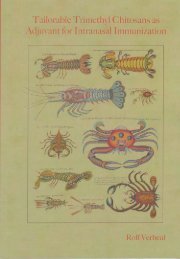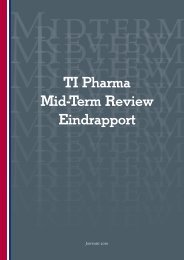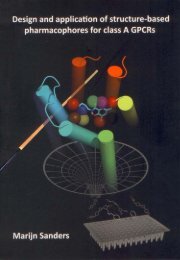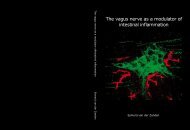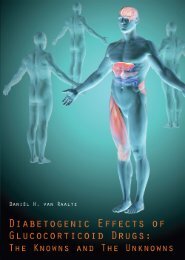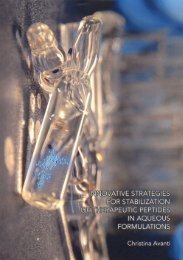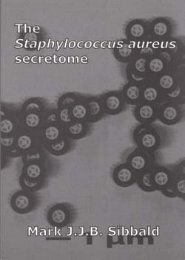Experimental infection and protection against ... - TI Pharma
Experimental infection and protection against ... - TI Pharma
Experimental infection and protection against ... - TI Pharma
Create successful ePaper yourself
Turn your PDF publications into a flip-book with our unique Google optimized e-Paper software.
246 Chapter 12<br />
Controlled human malaria <strong>infection</strong>s (CHMI) are trials in which healthy<br />
volunteers are exposed to malaria-infected mosquito bites, followed closely <strong>and</strong><br />
treated as soon as blood-stage parasites are detected by microscopy. These<br />
studies are used to assess preliminary efficacy of primarily pre-erythrocytic<br />
vaccine c<strong>and</strong>idates in a limited number of institutions worldwide. In section 2,<br />
we compared the safety <strong>and</strong> parasitological outcome of CHMI in different<br />
institutions <strong>and</strong> conclude that CHMI can be safely conducted, but will lead to<br />
grade 3 adverse events in a proportion of volunteers (Chapter 5). The primary<br />
parasitological outcome of such experiments is highly reproducible within<br />
institutions but may vary between trial centres. In addition, we evaluated the<br />
power of CHMI to detect vaccine efficacy of c<strong>and</strong>idate malaria vaccines (Chapter<br />
6) <strong>and</strong> found that CHMI can confidently assess a reduction in parasitemia for<br />
both pre-erythrocytic <strong>and</strong> blood stage vaccines, possibly broadening its<br />
application in malaria vaccine research.<br />
We subsequently improved the protocol of CHMI trials by increasing the<br />
portfolio of Pf parasites for CHMI with the successful establishment of a new Pf<br />
strain from Cambodia, NF135.C10 (Chapter 7). The availability of this strain<br />
allows for future assessment of cross-strain immunity induced by c<strong>and</strong>idate<br />
vaccines through heterologous CHMI trials. Furthermore, we tested<br />
unattenuated cryopreserved sporozoites for their infectivity by intradermal<br />
injection, proving potency in five of six volunteers from each of three dose<br />
groups (Chapter 8). The needle administration of sporozoites has advantages<br />
over mosquito delivery, in terms of dosing <strong>and</strong> exp<strong>and</strong>ing the global capacity to<br />
perform CHMI trials. However, future studies will need to focus on improving<br />
the administration of these sporozoites in order to achieve 100% <strong>infection</strong> rates.<br />
Moreover, with an increasing number of CHMI centres being installed, priority<br />
should be given to initiatives to st<strong>and</strong>ardize challenge procedures in order to<br />
ensure comparability of results worldwide.<br />
In section 3 we show that viable intact sporozoites are capable of inducing<br />
<strong>protection</strong> to Pf malaria in humans very efficiently, if high levels of blood stage<br />
parasitemia <strong>and</strong> clinical disease are prevented by co-administration of the drug<br />
chloroquine (CPS, Chapter 9). Chloroquine kills blood stage parasites but does<br />
not affect the hepatic development of malaria parasites. A protocol in which we<br />
exposed healthy, malaria-naïve volunteers to the bites of infected mosquitoes<br />
under chloroquine prophylaxis on three occasions with monthly intervals,<br />
rendered 10 of 10 volunteers protected <strong>against</strong> subsequent controlled <strong>infection</strong>.<br />
We found that <strong>protection</strong> was associated with an increased response of



